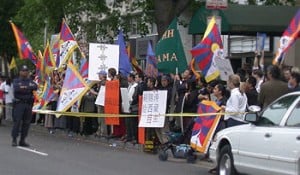In his two-day tour of Washington from April 30 to May 1, Hu was forced to hear U.S. concerns about human rights everywhere he went in Washington, including his 30-minute meeting with President Bush.
In their meeting, Bush told the Chinese vice president that China must respect religious freedom. Bush raised complaints of religious persecution, calling on the Chinese to be “sensitive to the concerns of… the Dalai Lama.”
At a meeting with congressional leaders led by House Speaker Dennis Hastert, Rep. Nancy Pelosi (D-CA), the second-ranking House Democrat, attempted to give Hu four letters concerning Chinese rights abuses including one letter, signed by Pelosi and Rep. Frank R. Wolf (R-VA), asking Hu to secure the release of 25 Tibetans imprisoned during China’s crackdown in Tibet in the late 1980s and early 1990s when Hu was party secretary there.
Protesters urged Chinese Vice President Hu Jintao to resolve the Tibet problem through negotiations with the Dalai Lama or his representatives.
Pelosi presented the letters to Hu, but he would not take them. She then tried to get Li Zhaoxing, the deputy foreign minister, to take the letters, but he silently refused and intentionally left them on the table as Vice President Hu’s delegation left the meeting.
Rep. Pelosi later said “I had been hopeful that we could at least talk about human rights issues in China and Tibet, but Vice President Hu’s refusal demonstrates how serious the problem remains.
“It’s just a common courtesy. I thought Hu at least would have taken the letters,” Wolf said.
On the same day that Hu met with Bush and other administration officials, two Tibetan nuns, Choeying Kunsang and Passang Lhamo, testified before the Congressional Human Rights Caucus on their experiences as torture survivors and political prisoners in Tibet’s Chinese-run prison system.
Senator Paul Wellstone introduced a resolution on the eve of Hu Jintao’s visit, marking the 13th birthday of the detained Panchen Lama, and calling for his release. The resolution will bring to Hu’s attention the widespread support in the U.S Congress for Tibet.
In addition to the concerns of U.S. lawmakers and leaders, Tibetans and Tibet supporters were visible outside of all Hu Jintao’s Washington meetings calling on him to resolve the Tibet problem through negotiations with the Dalai Lama and the Tibetan government in exile.
“Hu must understand that it is in the best interests of the Tibetan and Chinese people to resolve this issue peacefully,” said John Ackerly, President of the International Campaign for Tibet (ICT).


